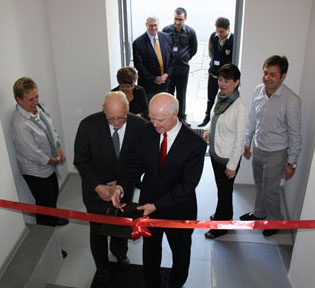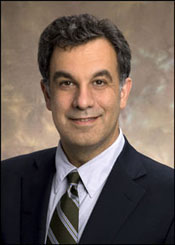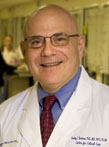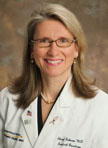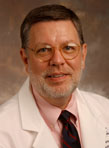 |
||||||||||||||||
February 2011 |
||||||||||||||||
Directing the AAMC as an advocate for academic medicineThis year is a special one for me. I am serving a one-year term as chair of the board of directors of the Association of American Medical Colleges (AAMC). The AAMC represents all 133 accredited U.S. and 17 accredited Canadian medical schools and 400 major teaching hospitals. That translates to 125,000 faculty members, 75,000 medical students, and 106,000 residents. The AAMC is working on three important issues that affect you as a patient or as a practicing physician. Three high profile areas are health care reform, increasing the number of doctors in the United States, and refining medical education. How health care reform plays out is yet to be seen. Implementation of one of the biggest measures—the proposal to cover at least 20 million uninsured Americans through Medicaid in 2014—will be retained in its current form is uncertain. There are many players in this debate, and certainly no solution will satisfy everyone, but what is at stake is people's access to health care. The AAMC has lent its expertise to inform the White House and Congress and will continue to advocate for health care coverage for all Americans. No matter what version of health care reform is enacted, the shortage of doctors will grow. This country faces a shortfall of more than 90,000 physicians by 2020 and produces only 27,000 new doctors each year. As many as one third of all practicing physicians may retire in the next 10 years. The AAMC continues to work with medical schools to increase access as one way to combat the shortage. Like many other medical schools, Emory has increased our enrollment about 15% over the past four years and will consider further expansion. Medical school curriculums are being modified throughout the nation. While still appropriately emphasizing the basic sciences, there is increasing emphasis placed on patient experiences very early in medical school. Quality of care, patient safety, access to care, and empowerment of patients are all key elements of curriculum changes in many medical schools. I am proud to say that Emory embraced these issues and many more when we introduced our new curriculum four years ago. Together we can continue to help steer the nation's health care agenda and the dialogue on the issues affecting our future.
Improving emergency medicine in Tbilisi
Last September, I had the privilege of seeing firsthand the remarkable accomplishments of the Partners for International Development (PfID)—formerly called the Atlanta-Tbilisi Healthcare Partnership—in our sister city in the Eastern European country of Georgia. Established to modernize the country's health care services and educational programs following the fall of the Soviet Union, the partnership has become one of Emory's largest and most effective international commitments, involving the schools of medicine, nursing, and public health as well as Grady Hospital, Morehouse, Georgia State University, and Georgia Tech. Many of these efforts are due to Ken Walker, professor of medicine, who has led the partnership since 1992. So it was my pleasure to accompany Ken on a recent trip to learn more about PfID and to attend the graduation of 10 emergency medicine residents who participated in an eight-month mini-residency program at Kipshidze Central University Hospital in Tbilisi. Our faculty developed the training course for members of the 2009 class, who served as trainers for the new graduates. Emory's medical school began a project three years ago to develop a system of emergency medical services in Georgia. Emory developed emergency care models and an improved system of referrals and outreach. The outdated model of the admitting room was replaced with one in which triage, rapid initiation of diagnostic tests, and trained physicians and nurses led to better care. Regulations that hampered the work of emergency medicine doctors, such as who can discharge patients, were revised. Emory and Georgian physicians also are working to establish a three-year residency in emergency medicine. At the end of our trip, Ken and I attended the opening of a PfID learning center that will host a USAID nursing education program in Tbilisi. Through a two-year, $2 million USAID grant, our nursing faculty developed a new four-year, university-level program at Tbilisi State University. The grant also helped fund classroom space, a simulation lab, clinical skills lab, and staff. Twenty nursing students were admitted to the program this past fall. Over the past three years, the program also has helped train 2,500 practicing nurses in the fields of emergency, critical care, and pre- and post-operative nursing.
Advancing medicine in the electronic age
What if you could quickly collect, manage, analyze, integrate, and store patient information easily in one place? And then conveniently and securely access that information to treat patients or conduct research in a particular area? That's the goal of the emerging field of biomedical informatics, a field that is rapidly expanding at Emory. "There is a need to develop faster, more effective ways to determine what you've got so you don't have to fish around for it," says Joel Saltz, director of the Center for Comprehensive Informatics and Emory Healthcare’s chief medical information officer. "Biomedical informatics makes it possible to pull together information—chart notes, pathology values, and radiologic findings—that is now in different forms and in different places into one place. Such a consolidated view of the information can be applied to better care for patients and advance research." One way Emory is contributing to this field is by developing a new biomedical informatics doctoral track. This is a multidisciplinary PhD track jointly administered by the Center for Comprehensive Informatics and the departments of mathematics and computer science and biostatistics and bioinformatics. The program is expected to attract students from such diverse backgrounds as engineering, medicine, and life sciences who share a common interest in advancing patient care, medical education, public health, and biomedical and clinical research. Pending approval from the university, a new department of biomedical informatics will be launched in the near future. The new graduate-level department will help integrate existing computer science, physical science, life science, and biomedical research programs at the SOM and other WHSC departments and will help foster collaborative projects in clinical and translational research, biomedical and imaging informatics, high performance computing, and grid computing. Saltz also was involved in establishing studio consultations for SOM researchers who are in need of biostatistics, informatics, and protocol support. The 30- to 60-minute consultations provide assistance to researchers in biostatistics, bioinformatics, database development, project generation planning, research design, and protocol planning and implementation. Offered by the Atlanta Clinical and Translational Science Institute (ACTSI), the consultations offer expert help from its Biostatistics, Epidemiology and Research Design (BERD) program, Biomedical Informatics Program (BIP), and Clinical Interaction Network (CIN). To request a consultation, submit a request on ACTSI's website.
Spotlight on pharmacologyEmory's department of pharmacology continues to be recognized as a premier department of pharmacology with excellence in both research and teaching. The department has 18 faculty and approximately 90 graduate students, postdoctoral fellows, and laboratory staff working together on a variety of research projects on treatment of neurologic disorders, addiction, cancer, and cardiovascular and muscle diseases. "Our department is becoming well-positioned to participate in the new NIH emphasis on translational medicine," notes the department’s chair, Raymond Dingledine, who is also executive associate dean for research at the SOM. "The department will continue to collaborate with the departments of neurology, psychiatry, ophthalmology, medicine and others to develop new therapeutics." Some of the more recent developments from the department include:
Recent awards and honors
Dwain Blackston (pediatrics and genetics) received the Lelia Denmark Lifetime Achievement Award from the Georgia chapter of the American Academy of Pediatrics. For more than three decades he has served as chair of the Georgia chapter's committee on children with disabilities. Tim Buchman (surgery) received the Distinguished Investigator Award from the American College of Critical Care Medicine, its most prestigious honor, for his work in contributing to the understanding of disease and the treatment of critically ill patients. Sheryl Gabram-Mendola (surgery) was appointed as a reviewer for cancer research funding awards by the Georgia Cancer Coalition. Hans Grossniklaus (ophthalmology) was named president-elect of the American Association of Ophthalmologic Oncologists and Pathologists and council chair-elect of the American Ophthalmological Society. Costas Hadjipanayis (neurosurgery) is the new president of the Southeastern Brain Tumor Foundation. In 2008, he was named a Georgia Cancer Coalition Distinguished Scientist, receiving funding to research more effective methods of delivering treatment to malignant brain tumors. Veda Johnson (pediatrics) received the 2010 Big Voice for Children Award at the Voices for Georgia's Children. Johnson has spearheaded the concept of school-based health clinics in Atlanta since 1994. Kamal Mansour (surgery) received the Inspiration Award from the Southern Thoracic Surgical Association for cultivating upcoming generations of cardiothoracic surgeons. He is only the second person to receive this award. Charles Moore (otolaryngology) received the 2011 Pride in the Profession Award from the American Medical Association for his work with underserved populations. Stephen Warren (human genetics) received the 2011 Dean's Distinguished Faculty Lecture and Award. Larry Young (psychiatry) received the Jean-Marie Delwart Award. A proclamation about this honor will be made at the annual session of the Academie des Sciences de Belgique.
| ||||||||||||||||
 |
||||||||||||||||

